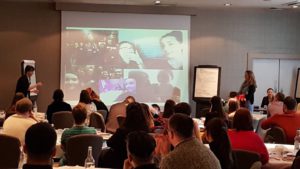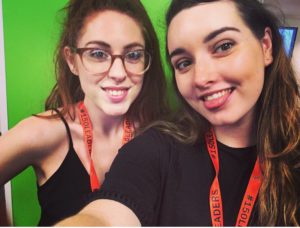Abigail Spragg shares her experiences of the Student Leadership Programme having been selected in 2017, returning as a speaker in 2018 and celebrating with all #150Leaders last month in London:
I had the pleasure of being a successful applicant for Cohort 2 of the Student Leadership Programme in 2017. The programme came at an interesting time for me; I was coming to the end of year one of my training, unsure what direction I was heading in and feeling very deflated by ‘burn out’ and uncertain of the direction of my future as a mental health nurse. I had applied for the programme because leadership was something I seemed to naturally enjoy, as well as seeing in my first placement that strong leadership was at the centre of brilliant team work and effective patient care. I did not know what to expect on the first day of the SLP; me and a colleague (now good friend) travelled from Plymouth to Birmingham, excited and apprehensive of what to expect from the next two days.
I can whole heartedly say that I was not expecting to enjoy and learn as much as I did from the two-day event. We had the opportunity to meet some incredible speakers such as Joanne Bosanquet and Brendan McCormack who eloquently spoke to us about their experiences of becoming leaders and over coming the many challenges to get to where they are today. Talking with and getting to know like minded students from across the UK was possibly the highlight of the programme; I met so many amazing students and was astounded by the compassion and knowledge they had in their area of healthcare. The third and fourth days of the programme took place in London a few months after, and I was filled with such pride and enthusiasm to be reunited with fellow student leaders again and learn more about what they had been doing since the first time we met. Professionally, I was now a few months into year two of my training and was feeling the common pressure of stepping up another study level. I felt confident and supported in sharing my experiences of overcoming my own struggles with fellow leaders and found the true meaning of emotional resilience. Learning more about what it means to be emotionally resilient was personally the most important skill I learnt from the programme, that I have utilised every day since. After the four days of the programme, I felt closer to carving my own student nurse journey and defining what I wanted to get out of my training. I felt motivated, empowered and ready to be the difference I wanted to see in mental health care.
Jumping forward further into second year, a lot has changed for me. I’ve utilised every skill learnt during the student leadership programme into being the best version of myself I can be. I’m part of a fantastic group of colleagues running the first Mental Health Nursing Society at my University, promoting and advocating for good mental health among students. I’m also now a trained PALS leader, one of the highlights of my degree so far, using my leadership skills to work with the first-year students to help their learning. Plus, for the first time during my third placement I was able to practice with confidence and recognise the difference I am making to patients’ lives. I continue to work on not being so self-critical and take any criticism received from placement teams as a vital component to improving my practice.

I had the privilege of returning to the student leadership programme this year in March, to talk to Cohort Four about what I learnt on the programme last year and my own leadership journey. Being able to present and talk about my journey has made me realise how far I have come since the first day of the programme and where I was in my training at that time. It has also made me realise how far I have still to go, but this no longer worries or scares me, it excites me. It also excites me that the incredible students I had the pleasure to meet in March and at cohort two are future leaders in healthcare. They are a creative, inspiring and resilient bunch of people who taught me more about leadership and myself than I could have ever imagined.
Moving Forward A Year – July 2018
I was very excited to receive an email from Nadia and the Council of Deans inviting us 150 Leaders to a summer conference in London. Re-connecting with the friends and professional links that I had made from Cohort Two and Four seemed like a perfect way to end my second year of being a Mental Health Nursing Student. I was also looking forward to discussing some difficulties I am having on my current placement and seek advice from some friendly faces on how they would use their leadership skills to succeed and get through it. As always, I felt apprehensive on the 10th July when travelling up to London; could I compare with the brilliant work my fellow leaders have achieved?
 My anxiety was soon diminished by seeing my friends and fellow colleagues from around the UK and the Council of Deans. Katerina began by celebrating our achievements advertised on Twitter and how we had all used what we have learnt in the Programme to positively influence our professional and personal lives, as well as the lives of fellow students and patients. We then had a stimulating talk from Professor Brian Webster-Henderson, who discussed with us the importance of Political Astuteness and how adopting this as a leader is a vital component to practicing effectively and to the best of our abilities. This was the first time I had the opportunity to reflect on being political astuteness in practice and I left the day keen to learn more and further my understanding on how I can improve this aspect of my leadership journey. Now, I clearly recognise the vitality of political astuteness and how I can impact practice by adopting this leadership style.
My anxiety was soon diminished by seeing my friends and fellow colleagues from around the UK and the Council of Deans. Katerina began by celebrating our achievements advertised on Twitter and how we had all used what we have learnt in the Programme to positively influence our professional and personal lives, as well as the lives of fellow students and patients. We then had a stimulating talk from Professor Brian Webster-Henderson, who discussed with us the importance of Political Astuteness and how adopting this as a leader is a vital component to practicing effectively and to the best of our abilities. This was the first time I had the opportunity to reflect on being political astuteness in practice and I left the day keen to learn more and further my understanding on how I can improve this aspect of my leadership journey. Now, I clearly recognise the vitality of political astuteness and how I can impact practice by adopting this leadership style.
Next, Dr Peter Shaw shared his ‘100 Tips for Leadership’ and I found reading through his book and listening to him an invaluable source of information. I particularly liked the parts about not seeking the approval from others and being able to reflect on where you are and where you want to be. Peter emphasised again the importance of reflection in practice and believing in yourself, your morals and your strengths. I also thoroughly enjoyed Professor Aisha Holloway’s presentation on the importance of Networking and the positive impact it can have on our professional lives and since this talk I have encouraged myself and other student nurses to seek out new networks via Twitter, University and beyond.
As I finish reflecting on the programme I have just come to the end of my second year as a Mental Health Nursing student. In my final weeks I have organised a student clinical supervision group for myself and fellow colleagues who also study Mental Health Nursing, after recognising the dire need for this and having discovered the value of peer-led support through being a part of the Student Leadership Programme. I have graduated as a ‘Wellbeing Champion’ for the University, meaning I get to promote good mental health throughout campus and beyond, working with students and staff to change the way we think about mental wellbeing and making vital improvements to university life. Without the Student Leadership Programme, I doubt I would have the confidence and leadership skills to seize these opportunities and seek them out myself. I look very much forward to the final year of my degree as a healthcare student and hope to continue coming up with innovative ideas and sinking my teeth into more leadership roles.
I cannot thank the Council of Deans and the Burdett Trust for providing students with this experience. It has been invaluable and precious to me and I know so many others feel the same. I hope in the future the student leadership programme can be adapted and shaped to be a part of every healthcare students journey, as I know so many others would benefit from what the incredible programme has to offer.
